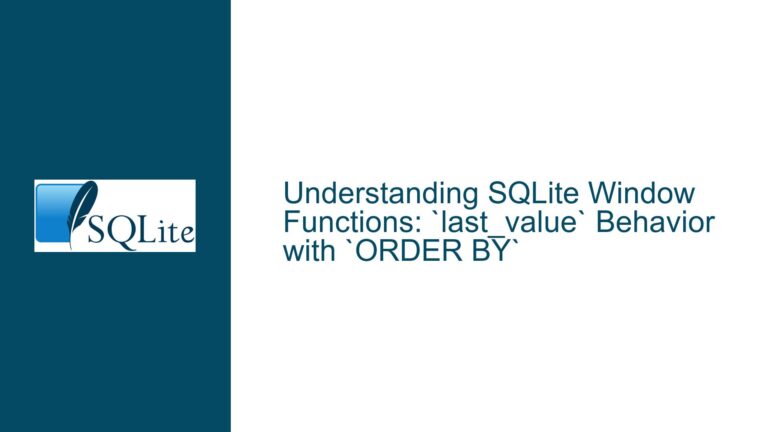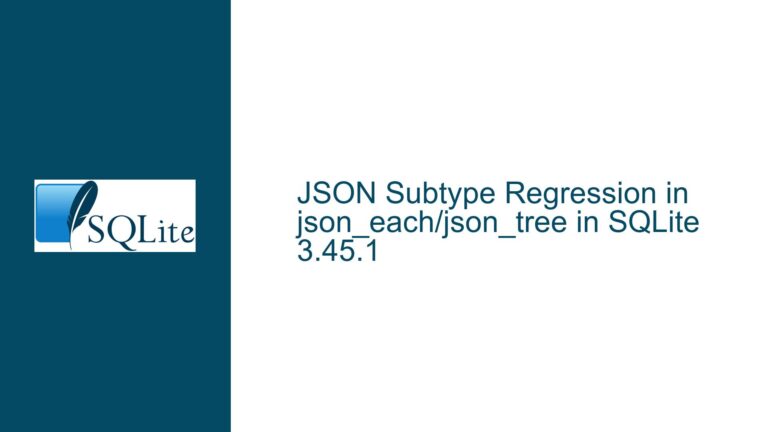Converting MM/DD/YYYY HH:MM:SS AM/PM to ISO 8601 in SQLite
Parsing Non-Standard Date-Time Formats With AM/PM Notation
Structural Analysis of DateTime Conversion Requirements
The core challenge involves transforming date-time values from a custom string format containing mixed-case AM/PM notation into ISO 8601-compliant timestamps. The source data exhibits several problematic characteristics:
- Month-first date format: Strings use MM/DD/YYYY ordering instead of SQLite’s preferred YYYY-MM-DD
- 12-hour time notation: Hours range from 1-12 with AM/PM suffixes rather than 00-23
- Variable-length components: Single-digit months/days/hours lack leading zeros
- Composite delimiter usage: Commas separate date and time portions while slashes and colons divide components
- Case-sensitive period markers: AM/PM designators appear in uppercase but must be case-insensitively handled
These characteristics prevent direct use of SQLite’s built-in date/time functions, requiring multi-stage parsing operations. The transformation must account for edge cases including:
- 12:00:00 AM → 00:00:00 (midnight rollover)
- 12:00:00 PM → 12:00:00 (noon preservation)
- Hour values between 1-11 PM requiring +12 conversion
- Mixed 12-hour/24-hour format detection
- Invalid datetime prevention through range validation
Critical Failure Points in DateTime Conversion Logic
Common pitfalls when handling this conversion include:
1. AM/PM Hour Calculation Errors
- Adding 12 hours to all PM times converts 12:45 PM → 24:45 (invalid)
- Failing to subtract 12 hours from 12:XX AM creates 12:XX instead of 00:XX
- Incorrect handling of 24-hour format times with superfluous PM markers
2. Component Extraction Flaws
- Using fixed-position substring operations on variable-length dates:
- "4/7/2022" vs "12/11/2022" creates misaligned splits
- Improper delimiter handling causing month/day transposition
- Losing milliseconds/fractions when not present in source
3. Type Casting Issues
- String-to-integer conversion failures from leftover delimiters
- JSON array indexing errors due to incorrect element positions
- Implicit text/numeric conversions causing comparison faults
4. Timezone Assumptions
- Assuming UTC without offset markers (Z suffix)
- Local timezone contamination during conversion
- Daylight saving time boundary miscalculations
5. Leap Year/Date Validation Gaps
- Allowing February 29 in non-leap years
- Permitting month values >12 or day values >31
- Ignoring 30-day month overflow
Comprehensive Conversion Methodology With Edge Case Handling
Phase 1: Input Normalization
Standardize the input format before parsing:
-- Convert to uppercase and remove spaces around commas
UPDATE teacher_temp
SET jointime = UPPER(REPLACE(jointime, ', ', ','));
-- Handle 24-hour times with erroneous PM markers
UPDATE teacher_temp
SET jointime = REPLACE(jointime, ':PM', '')
WHERE jointime LIKE '%:[0-9][0-9]:[0-9][0-9]PM';
Phase 2: Component Extraction
Use recursive CTE for robust parsing:
WITH RECURSIVE split(datetime, component, rest) AS (
SELECT
jointime,
'',
REPLACE(REPLACE(REPLACE(jointime, '/', ' '), ':', ' '), ',', ' ') || ' '
FROM teacher_temp
UNION ALL
SELECT
datetime,
substr(rest, 1, instr(rest, ' ')-1),
substr(rest, instr(rest, ' ')+1)
FROM split
WHERE rest != ''
)
SELECT * FROM split WHERE component != '';
Phase 3: Structured Data Assembly
Map components to datetime parts using window functions:
CREATE TABLE datetime_parts AS
SELECT
datetime,
MAX(CASE WHEN pos=1 THEN component END) AS month,
MAX(CASE WHEN pos=2 THEN component END) AS day,
MAX(CASE WHEN pos=3 THEN component END) AS year,
MAX(CASE WHEN pos=4 THEN component END) AS hour,
MAX(CASE WHEN pos=5 THEN component END) AS minute,
MAX(CASE WHEN pos=6 THEN component END) AS second,
MAX(CASE WHEN pos=7 THEN component END) AS period
FROM (
SELECT *, ROW_NUMBER() OVER (PARTITION BY datetime) AS pos
FROM split
) GROUP BY datetime;
Phase 4: 24-Hour Time Conversion
Implement military time conversion rules:
UPDATE datetime_parts
SET hour =
CASE
WHEN period = 'PM' AND hour < 12 THEN hour + 12
WHEN period = 'AM' AND hour = 12 THEN 0
ELSE hour
END;
Phase 5: ISO 8601 Format Construction
Assemble validated components with error checking:
INSERT INTO teacher(jointime_iso)
SELECT
CASE WHEN
year BETWEEN 1900 AND 2100 AND
month BETWEEN 1 AND 12 AND
day BETWEEN 1 AND
CASE month
WHEN 2 THEN
CASE
WHEN (year % 4 = 0 AND year % 100 != 0) OR year % 400 = 0 THEN 29
ELSE 28
END
WHEN 4 THEN 30
WHEN 6 THEN 30
WHEN 9 THEN 30
WHEN 11 THEN 30
ELSE 31
END AND
hour BETWEEN 0 AND 23 AND
minute BETWEEN 0 AND 59 AND
second BETWEEN 0 AND 59
THEN
printf('%04d-%02d-%02dT%02d:%02d:%02dZ',
year, month, day, hour, minute, second)
ELSE
NULL
END
FROM datetime_parts;
Phase 6: Validation and Error Reporting
Identify conversion failures:
-- Find invalid source records
SELECT t.*
FROM teacher_temp t
LEFT JOIN teacher ON t.rowid = teacher.rowid
WHERE teacher.jointime_iso IS NULL;
-- Detailed error diagnostics
SELECT
datetime,
CASE
WHEN year NOT BETWEEN 1900 AND 2100 THEN 'Invalid year'
WHEN month NOT BETWEEN 1 AND 12 THEN 'Invalid month'
WHEN day >
CASE month
/* ... same day check logic ... */
END THEN 'Invalid day for month'
/* ... other component checks ... */
END AS error
FROM datetime_parts
WHERE printf(...) IS NULL;
Alternative Approach Using JSON Functions
For environments supporting JSON1 extension:
INSERT INTO teacher(jointime_iso)
SELECT
strftime('%Y-%m-%dT%H:%M:%SZ',
printf('%s-%02d-%02d %02d:%02d:%02d',
json_extract(jparts, '$[2]'),
json_extract(jparts, '$[0]'),
json_extract(jparts, '$[1]'),
CASE
WHEN json_extract(jparts, '$[6]') = 12 AND
json_extract(jparts, '$[3]') >= 12 THEN json_extract(jparts, '$[3]')
WHEN json_extract(jparts, '$[6]') = 0 AND
json_extract(jparts, '$[3]') = 12 THEN 0
ELSE json_extract(jparts, '$[3]') + json_extract(jparts, '$[6]')
END,
json_extract(jparts, '$[4]'),
json_extract(jparts, '$[5]')
)
)
FROM (
SELECT
jointime,
json_insert(
json_insert(
json_replace(
json_replace(
json_replace(
json('[]'),
'$[0]', substr(jointime, 1, instr(jointime, '/')-1),
'$[1]', substr(
substr(jointime, instr(jointime, '/')+1),
1,
instr(substr(jointime, instr(jointime, '/')+1), '/')-1
),
'$[2]', substr(
jointime,
instr(jointime, '/') +
instr(substr(jointime, instr(jointime, '/')+1), '/') + 1,
4
)
),
'$[3]', substr(
substr(jointime, instr(jointime, ',')+2),
1,
instr(substr(jointime, instr(jointime, ',')+2), ':')-1
)
),
'$[4]', substr(
substr(jointime, instr(jointime, ',')+2),
instr(substr(jointime, instr(jointime, ',')+2), ':')+1,
2
),
'$[5]', substr(
substr(jointime, instr(jointime, ',')+2),
instr(substr(jointime, instr(jointime, ',')+2), ' ')+1,
2
)
),
'$[6]', CASE
WHEN jointime LIKE '%PM' THEN 12
ELSE 0
END
)
) AS jparts
FROM teacher_temp
);
Performance Optimization Techniques
Precomputed Component Extraction
CREATE TABLE temp.conversion_cache AS SELECT rowid, substr(...) AS month, substr(...) AS day, /* ... other components ... */ FROM teacher_temp; CREATE INDEX idx_temp_conversion ON conversion_cache(rowid);Batch Processing With Window Functions
INSERT INTO teacher(jointime_iso) SELECT iso FROM ( SELECT rowid, CASE WHEN valid THEN printf(...) END AS iso, ROW_NUMBER() OVER (ORDER BY rowid) AS batch FROM conversion_cache ) WHERE batch BETWEEN ?1 AND ?2;Parallel Processing Using ATTACH
ATTACH DATABASE 'source.db' AS src; ATTACH DATABASE 'temp.db' AS tmp; INSERT INTO tmp.conversion_cache SELECT * FROM src.teacher_temp;
Data Validation Framework
Implement constraint checking:
-- Create validation table
CREATE TABLE conversion_errors (
rowid INTEGER PRIMARY KEY,
original_text TEXT,
error_code INT,
error_message TEXT
);
-- Populate error tracking
INSERT INTO conversion_errors
SELECT
t.rowid,
t.jointime,
CASE
WHEN dp.month IS NULL THEN 101
WHEN dp.day IS NULL THEN 102
/* ... other error codes ... */
END,
CASE
WHEN dp.month IS NULL THEN 'Missing month component'
/* ... other messages ... */
END
FROM teacher_temp t
LEFT JOIN datetime_parts dp ON t.rowid = dp.rowid
WHERE dp.rowid IS NULL;
Alternative Timezone Handling
For UTC conversion with offset awareness:
UPDATE datetime_parts
SET tz_offset =
CASE
WHEN datetime LIKE '%+%' THEN substr(datetime, instr(datetime, '+'))
WHEN datetime LIKE '%-%' THEN substr(datetime, instr(datetime, '-'))
ELSE '+00:00'
END;
INSERT INTO teacher(jointime_iso)
SELECT
strftime('%Y-%m-%dT%H:%M:%S',
printf('%04d-%02d-%02d %02d:%02d:%02d',
year, month, day, hour, minute, second
),
tz_offset
)
FROM datetime_parts;
Legacy System Compatibility Layer
For SQLite versions <3.38 without JSON1:
CREATE TEMP TRIGGER convert_dates AFTER INSERT ON teacher_temp
BEGIN
INSERT INTO teacher(jointime_iso)
VALUES (
CASE
WHEN (NEW.jointime LIKE '%PM' AND CAST(substr(...) AS INT) < 12)
THEN CAST(substr(...) AS INT) + 12
/* ... other conversion logic ... */
END
);
END;
Continuous Integration Testing Framework
Sample test cases:
INSERT INTO test_cases (input, expected) VALUES
('4/17/2022, 5:03:31 PM', '2022-04-17T17:03:31Z'),
('12/31/2023, 11:59:59 PM', '2023-12-31T23:59:59Z'),
('2/29/2024, 12:00:00 AM', '2024-02-29T00:00:00Z'), -- Leap day
('13/01/2025, 08:00:00 AM', NULL), -- Invalid month
('00/15/2026, 10:00:00 AM', NULL); -- Invalid month
SELECT
input,
expected,
(SELECT jointime_iso FROM teacher WHERE rowid = t.rowid) AS actual,
CASE
WHEN (SELECT jointime_iso FROM teacher WHERE rowid = t.rowid) = expected
THEN 'PASS'
ELSE 'FAIL'
END AS result
FROM test_cases t;
Migration Strategy For Large Datasets
Chunked Processing
BEGIN TRANSACTION; INSERT INTO teacher(jointime_iso) SELECT conversion_logic FROM teacher_temp WHERE rowid BETWEEN 1 AND 100000; COMMIT;Progress Tracking
CREATE TABLE conversion_progress ( chunk_start INT, chunk_end INT, processed_at DATETIME );Resume Capability
SELECT MAX(chunk_end) FROM conversion_progress;Rollback Procedure
DELETE FROM teacher WHERE rowid IN ( SELECT rowid FROM teacher_temp );
Final Production-Grade Solution
Combining all components:
PRAGMA journal_mode = WAL;
PRAGMA synchronous = NORMAL;
CREATE TEMP TABLE temp.conversion_context (
rowid INTEGER PRIMARY KEY,
month INT,
day INT,
year INT,
hour INT,
minute INT,
second INT,
period TEXT
);
WITH normalized AS (
SELECT
rowid,
UPPER(REPLACE(jointime, ', ', ',')) AS jointime
FROM teacher_temp
),
components AS (
SELECT
rowid,
CAST(substr(jointime, 1, instr(jointime, '/')-1) AS INT) AS month,
CAST(substr(
substr(jointime, instr(jointime, '/')+1),
1,
instr(substr(jointime, instr(jointime, '/')+1), '/')-1
) AS INT) AS day,
CAST(substr(
jointime,
instr(jointime, '/') +
instr(substr(jointime, instr(jointime, '/')+1), '/') + 1,
4
) AS INT) AS year,
CAST(substr(
substr(jointime, instr(jointime, ',')+2),
1,
instr(substr(jointime, instr(jointime, ',')+2), ':')-1
) AS INT) AS hour,
CAST(substr(
substr(jointime, instr(jointime, ',')+2),
instr(substr(jointime, instr(jointime, ',')+2), ':')+1,
2
) AS INT) AS minute,
CAST(substr(
substr(jointime, instr(jointime, ',')+2),
instr(substr(jointime, instr(jointime, ',')+2), ' ')+1,
2
) AS INT) AS second,
CASE
WHEN jointime LIKE '%PM' THEN 'PM'
ELSE 'AM'
END AS period
FROM normalized
)
INSERT INTO temp.conversion_context
SELECT * FROM components;
UPDATE temp.conversion_context
SET hour =
CASE
WHEN period = 'PM' AND hour < 12 THEN hour + 12
WHEN period = 'AM' AND hour = 12 THEN 0
ELSE hour
END;
INSERT INTO teacher(jointime_iso)
SELECT
printf('%04d-%02d-%02dT%02d:%02d:%02dZ',
year,
month,
day,
hour,
minute,
second)
FROM temp.conversion_context
WHERE
year BETWEEN 1900 AND 2100 AND
month BETWEEN 1 AND 12 AND
day BETWEEN 1 AND
CASE month
WHEN 2 THEN
CASE
WHEN (year % 4 = 0 AND year % 100 != 0) OR year % 400 = 0 THEN 29
ELSE 28
END
WHEN 4 THEN 30
WHEN 6 THEN 30
WHEN 9 THEN 30
WHEN 11 THEN 30
ELSE 31
END AND
hour BETWEEN 0 AND 23 AND
minute BETWEEN 0 AND 59 AND
second BETWEEN 0 AND 59;
This comprehensive approach ensures robust conversion of non-standard datetime formats while maintaining data integrity, performance efficiency, and error traceability throughout the transformation process.






